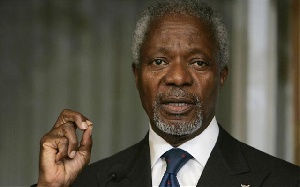Drugs have destroyed many lives, but wrong government policies have destroyed many more, former UN Secretary General Kofi Annan has said.
“We all want to protect our families from the potential harm of drugs. But if our children do develop a drug problem, surely we will want them cared for as patients in need of treatment and not branded as criminals,” Mr Annan wrote concerning the subject: ‘Why I'm calling to end the war on drugs’ on his LinkedIn account.
Mr Annan, who has made public, his stance against criminalisation of drug use, said prohibiting the use of drugs has had little impact on the supply of, or demand for drugs, adding that a war on drug users was a war on people.
“Globally, the war on drugs has not succeeded. Some estimate that enforcing global prohibition costs at least $100 billion (€90.7 billion) a year, but as many as 300 million people now use drugs worldwide, contributing to a global illicit market with a turnover of $330 billion a year, one of the largest commodity markets in the world,” he said.
“Prohibition has had little impact on the supply of or demand for drugs. When law enforcement succeeds in one area, drug production simply moves to another region or country; drug trafficking moves to another route and drug users switch to a different drug. Nor has prohibition significantly reduced use. Studies have consistently failed to establish the existence of a link between the harshness of a country's drug laws and its levels of drug use. The widespread criminalisation and punishment of people who use drugs, the overcrowded prisons, mean that the war on drugs is, to a significant degree, a war on drug users – a war on people.”
Mr Annan said Africa was under threat because the continent had become a major transit point for drugs.
The former UN chief added: “Africa is sadly an example of these problems. The West Africa Commission on Drugs, which my foundation convened, reported last year that the region had now become not only a major transit point between producers in Latin America and consumers in Europe, but an area where consumption is increasing. Drug money, and the criminality associated with it, is fostering corruption and violence. The stability of countries and the region as a whole is under threat.
“I believe that drugs have destroyed many lives, but wrong government policies have destroyed many more. We all want to protect our families from the potential harm of drugs. But if our children do develop a drug problem, surely we will want them cared for as patients in need of treatment and not branded as criminals.
He has, therefore, called for an end to the stigmatisation of drug users.
“The tendency in many parts of the world to stigmatise and incarcerate drug users has prevented many from seeking medical treatment. In what other areas of public health do we criminalise patients in need of help? Punitive measures have sent many people to prison, where their drug use has worsened,” he stated.
“A criminal record for a young person for a minor drug offence can be a far greater threat to their wellbeing than occasional drug use. The original intent of drug policy, according to the UN Convention on Narcotic Drugs, was to protect the "health and welfare of mankind." We need to refocus international and national policy on this key objective”.
General News of Sunday, 24 April 2016
Source: classfmonline.com

















